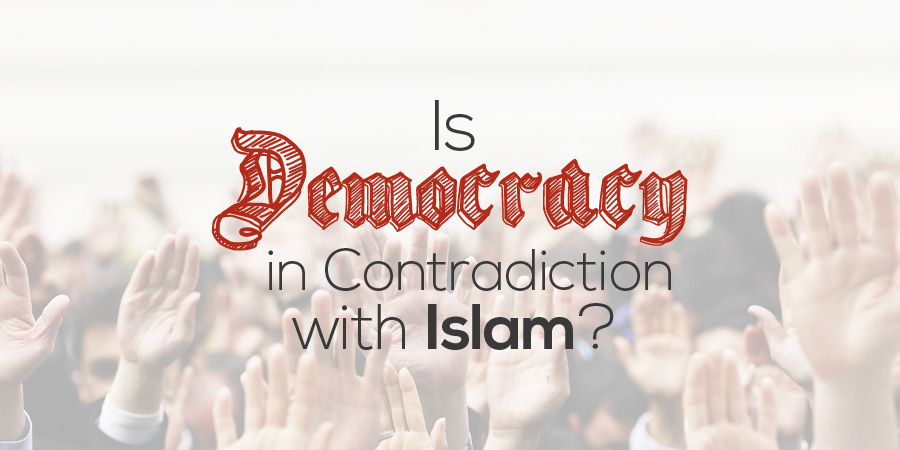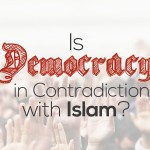Is Democracy in Contradiction with Islam? (4)

Advancing democracy in the sphere of management
Three meanings of democracy have been mentioned, all of which are related to political philosophy, but some writers who portray themselves as “intellectuals” claim that in essence the concept of democracy has nothing to do with political philosophy for it is related to the domain of management. The simple reply to these individuals is that a survey will make it clear that there is no book of political philosophy in which democracy is not touched.
If the concept of democracy is not related to political philosophy, why is it extensively discussed in all political philosophy books? The secret behind this claim is that recently, liberal thinkers and writers of the West have presented a new definition of democracy to keep it out of the political vocabulary and insert it in other realms of social sciences.
They have asserted that democracy is meant to limit the power of the ruler and foster compromise among opposing groups and encourage conciliation among parties and groups, and it is not only related to administration but also applicable to management. For example, if there is a difference of opinion among managers of a company or among their subordinates, they must arrive at a consensus because persistence of this difference of opinion will not be beneficial for the company. So, in order to advance the interest of the company, they have to consult one another and finally arrive at an agreement, or uphold the majority decision. They call this the ‘democratic’ method.
Democracy is now a way of removing differences within an organization. Given this definition, democracy in its general sense is taken out of political philosophy and introduced in the sphere of management. Governance and administration is actually also a managerial task on a grand scale, but it has a specific domain and in order to expand the concept of democracy, they assert that whenever there is conflict between two groups a reconciliation in the above manner will be based on democracy. The explanation for this is that in the conflict between two groups, one group may dominate the other by force and impose its view. Certainly, this approach is undemocratic. But if they agree and finally uphold the majority opinion, that means putting democracy into practice.
We do not oppose the coinage or expansion of a scientific term, but it must not be forgotten that this concept is originally related to the realm of politics and extended to other domains. In social sciences, there are many similar concepts which were initially used in one field and after extending their meanings, applied in various contexts in other fields. For instance, the concept of “strategy” is used commonly in all fields. Basically, this term means “leading an army” [sawq al-jayshi], used in military science, and “strategist” is the one who is in charge of planning and commanding the war. The area where an army encamps or stays or where an attack will commence is called “strategic area”.
Later on, this concept was gradually adopted by other sciences and is now used, in political discussions as “strategic policies”. Even in training and education and different types of management, “strategic issues” are tackled. For instance, we have provisions of the constitution that are “strategic” in nature such as the article that emphasizes the necessity of adapting laws of the country to Islam. Yet, it is astonishing that sometimes some elements talk about the Constitution as if it is above the Qur’an and divine revelation. At times, they also oppose it as if it is of no value to them at all.
Wherever the Constitution deals with honoring the will of people, they do not allow even the verses of the Qur’an to state anything against it; the Prophet (s), infallible Imams (‘a) and the Imam of the Time(‘a) have also no right to oppose it! But the provision of the Constitution which stipulates that all existing laws in the country must be compatible with Islam is forgotten and to oppose it is declared lawful. They say, “The basis is the people’s vote!”
Is it not enshrined in the same constitution that laws to be enacted in the country must be compatible with Islam? So, if something is haram according to Islam, how can you afford to declare it lawful by citing the Constitution? Considering this constitution emphasizes the observance of Islam, how is it that it is free to insult sanctities and essential laws of Islam by invoking freedom of the press? The press is free within the framework of law, and not beyond it. When Islamic law regards it obligatory to honor religious sanctities and not to slight laws of Islam and mock God and the Prophet (s) as it will be tantamount to apostasy, law on freedom of the press cannot declare such a thing lawful. The Constitution is originally codified to expound the concept of an Islamic Republic.
Form of democracy acceptable to Islam
The second meaning of democracy has been accepted with certain conditions and qualifications. No legislative authority has the right to oppose the definite laws of Islam which is how we accept democracy. Meanwhile, concerning democracy as a method of solving differences, it must be said that as long as Islamic values are sufficient to solve differences, they shall take precedence, but in case of differences where Islamic laws have no specific way of solving them and there is also no competent arbiter, the majority view shall be preferred.
For example, a number of people form a committee within the framework of law to decide an important matter and all believe in Islam and observe Islamic values, but do not arrive at a consensus on the issue as the majority has a certain opinion while the minority has another opinion and there is no basis to prefer one view over the other—the majority view will take precedence, and opposing majority view shall be considered an undue preference.
As such, whenever we have no preferable option, we can obtain a sound opinion from the majority view which will be credible and preferred. If through the majority view of ignoramuses, we can not obtain a sound opinion, preferring that opinion will be rationally reproachable and incorrect. This method is credible to a certain extent, but it is not correct to abuse it by placing the majority of people against a minority of experts. For example, let us assume that for sketching a military plan there are ten military experts and one thousand common people who are unfamiliar with military issues.
If attention is given to the view of common people who are unfamiliar with military issues while the view of experts is rejected, this act is unreasonable. Every intelligent person says that the view of the experts takes precedence over the view of non-experts. Thus, democracy as a means of solving differences with certain limits and conditions is credible, but as the basis of giving preference to every majority over every minority it is not credible
Muhammad Taqi Misbah Yazdi Written by
Mansoor L. Limba Translated by


